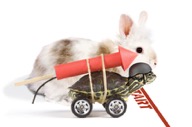Collaboration & Teamwork
Play Well in the Sandbox to Excel in the Sandbox
03/09/04 Filed in: Leadership Articles
Question...so why care about playing well with others? Because it’s a key to success, whether defined in terms of career, money, or a meaningful life. Hands down, people competency is the most distinguishing feature of top performers. By ‘people competency’ I mean emotional intelligence, interpersonal effectiveness, and team related skills – in short, playing well with others.
Read More...
Read More...
Comments
Motivation Wisdom
04/10/05 Filed in: Leadership Articles
“How do I motivate the people in my organization?” It’s a question I hear often; but what’s really being asked is how to get people to do more on their own – to be “self” motivated. Is there a way to get people to go beyond what is minimally required?
Motivation, like morale and loyalty, is not something you operate but a condition you cultivate. There is no magic lever to pull that turns on motivation. Rather, motivation is like a garden and will grow on its own with proper conditions, care, and cultivation. Read More...
Motivation, like morale and loyalty, is not something you operate but a condition you cultivate. There is no magic lever to pull that turns on motivation. Rather, motivation is like a garden and will grow on its own with proper conditions, care, and cultivation. Read More...
Make Meetings Matter
03/08/04 Filed in: Leadership Articles
Never have a meeting without a PURPOSE! And the worthwhile purposes for having a meeting are alignment, attunement, and action. Here’s what to do, and here’s what to avoid... Read More...
Make the Most of Teams
28/03/06 Filed in: Leadership Articles
Is your company vigorously promoting teams? Are you dreaming of transforming your group so it responds like a high-performance team every day? Proceed carefully.
Anyone who has been part of a high-performance team knows the exhilaration felt when everyone clicks and team efforts bring that major goal within reach. Truth is, a high-performance team has become the gold standard of people working at their best. Some companies promote ‘teams’ as the best working solution for everything they do.
But not all situations are best served by pushing people to work in teams. In fact, when misapplied, working as a team may hurt, rather than help, both individual performance and the bottom line. Read More...
Anyone who has been part of a high-performance team knows the exhilaration felt when everyone clicks and team efforts bring that major goal within reach. Truth is, a high-performance team has become the gold standard of people working at their best. Some companies promote ‘teams’ as the best working solution for everything they do.
But not all situations are best served by pushing people to work in teams. In fact, when misapplied, working as a team may hurt, rather than help, both individual performance and the bottom line. Read More...
Leadership and the 8th Muda
26/05/07 Filed in: Leadership Articles
As a leader in your organization, do you add muda or subtract it?
Muda is a Japanese term for waste. One of the prime tenants of the Toyota production system, to which much of that company’s outstanding quality and profitability can be attributed, is to reduce muda. The organization is built on constant striving to identify and eliminate anything that does not add value for the final customer. The Toyota processes are now used worldwide, often called LEAN processing.
Seven mudas are traditionally recognized: overproduction, waiting, unnecessary transport, over processing, excess inventory, unnecessary movement, and defects. Jeffrey K. Liker, in his excellent book The Toyota Way, adds an eighth muda – unused employee creativity.
Liker describes the eighth muda as the waste of “losing time, ideas, skills, improvements, and learning opportunities by not engaging or listening to your employees.” Too many organizations suffer from CEOs or owners that inflate the eighth muda, rather than contribute to its elimination.
Read More...
Muda is a Japanese term for waste. One of the prime tenants of the Toyota production system, to which much of that company’s outstanding quality and profitability can be attributed, is to reduce muda. The organization is built on constant striving to identify and eliminate anything that does not add value for the final customer. The Toyota processes are now used worldwide, often called LEAN processing.
Seven mudas are traditionally recognized: overproduction, waiting, unnecessary transport, over processing, excess inventory, unnecessary movement, and defects. Jeffrey K. Liker, in his excellent book The Toyota Way, adds an eighth muda – unused employee creativity.
Liker describes the eighth muda as the waste of “losing time, ideas, skills, improvements, and learning opportunities by not engaging or listening to your employees.” Too many organizations suffer from CEOs or owners that inflate the eighth muda, rather than contribute to its elimination.
Read More...
Collaboration Across Boundaries
18/09/06 Filed in: Leadership Articles
In an increasingly complex world you will be more likely to face the challenge of working across major organizational boundaries. Maybe it will take the form of cross-functional teams or cross-departmental projects within an organization. Maybe it will take the form of several companies working together to realize a business opportunity.
Whether your project crosses functions, silos, organizations, or industry sectors, to ensure success you’ll want to find coherent answers to these 5 key questions... Read More...
Whether your project crosses functions, silos, organizations, or industry sectors, to ensure success you’ll want to find coherent answers to these 5 key questions... Read More...
